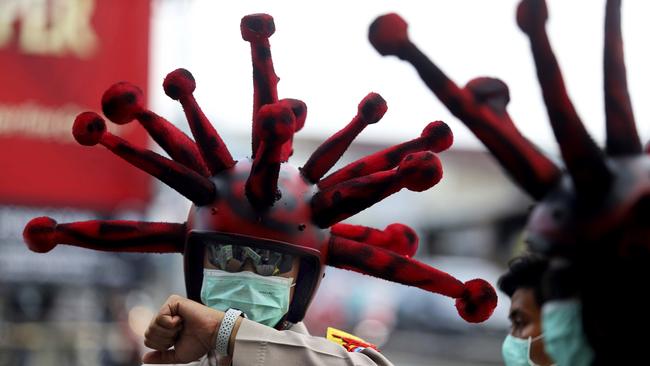Coronavirus: Backlog of Indonesian test results a recipe for disaster
Indonesia has a backlog of thousands of COVID-19 test swabs waiting to be processed in a handful of functioning laboratories.

Indonesia has a backlog of thousands of COVID-19 test swabs waiting to be processed in a handful of functioning laboratories and is relying heavily on rapid antibody tests not designed to diagnose current infections, The Australian has learned.
The practice has prompted a warning from one of the world’s leading coronavirus experts that using antibody tests to diagnose current infections could lead to false negatives with the potential to escalate — rather than limit — the spread of the disease.
Indonesian authorities have conducted 11,242 rapid PCR (Polymerase Chain Reaction) tests on a population of 267 million — 26 tests per million people — largely because of a critical shortage of test kits. Australia has tested 11,300 per million. The government has been playing catch-up for weeks after initially playing down the coronavirus and only on Sunday received 50,000 donated PCR tests from South Korea despite repeated appeals from public health experts to source more.
But scientists working in approved Indonesian medical laboratories have also told The Australian COVID-19 swab samples are piling up because not all earmarked testing facilities are working as they should.
“We have a backlog of samples at the moment. Last week we had hundreds, now it’s thousands,” said Herawati Sudoyo, deputy research director at Indonesia’s Eijkman Institute.
“The government has said we have quite a few labs that can carry out PCR tests, but in reality there are only a handful of labs that have the facilities, infrastructure and trained staff to carry them out.”
The problem has become acute given the government is demanding local administrations provide PCR test results to prove the need for movement restrictions.
Jakarta governor Anies Baswedan, who has been lobbying to lock down the capital, on Monday accused the government of showing “no sense of urgency” in the face of a rising death toll.
Indonesia has 2491 confirmed COVID-19 cases and 209 fatalities, Asia’s highest death rate outside of China, though even that figure has been widely questioned.
London’s Centre for Mathematical Modelling of Infectious Diseases estimated the country’s official COVID-19 tally could be as little as 2 per cent of its true infection rate. To make up for the shortfall of PCR tests, the Indonesian health ministry last month imported and distributed 400,000 rapid pin-prick serology tests to provincial governments which have since been conducting massive testing drives using kits designed to identify those who have had the disease, but are not necessarily still infected.
PCR tests detect viral RNA in the body and whether a person is currently infected. Serology tests determine whether a person has developed antibodies to fight the disease, detectable from seven to 14 days after first infection when the body may have fought off the virus. Dr Herawati said more PCR tests were “urgently” needed because “a rapid serology test cannot be a standalone diagnostic tool. That’s not what it is meant for”.
“If we were more prepared we would have the rapid PCR tests already and we’d have used those since the beginning. We weren’t, so now it feels like we are doing things on the fly.”
Some governors have credited the antibody tests with identifying COVID-19 clusters.
But Linfa Wang, of Duke NUS University in Singapore, said there was a danger such tests could produce false negatives in the early stages of infection. “If you want to detect current infections, antibody tests aren’t really going to help. The danger is if you’re only on day five of an infection you could test negative but still be shedding the virus,” Professor Wang said.
Serology tests were being used in countries such as Singapore and Australia, but to answer different questions such as the level and average age of community exposure.
Nurul Nadia, a public health expert at Indonesia’s Centre for Strategic Development Initiatives, said Indonesia was not alone in using serology tests for COVID-19 infection diagnoses despite the fact it was “far from ideal”. “For a country that doesn’t have the luxury of an established infrastructure for mass PCR tests, doing rapid serology tests shows that at least they are doing something.”



To join the conversation, please log in. Don't have an account? Register
Join the conversation, you are commenting as Logout